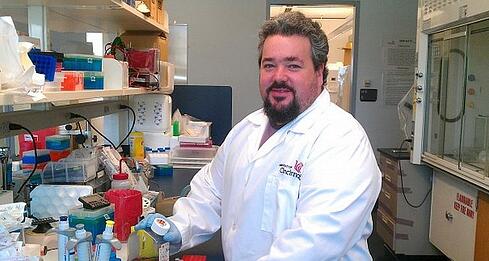The University of Cincinnati is making great progress in the field of cancer immunotherapy, developing both an oral vaccine for breast cancer and a vaccine for lung cancer in quick succession. Using unique approaches in both solutions, research teams have overcome some previous obstacles in the field to move forward and fight cancer on multiple fronts.
 The core concept of immunotherapy is simple: vaccinate against some virus or antigen that exists specifically in tumor cells so that the body can learn to destroy tumor cells with its own immune system. This is easier said than done, according to John Morris (right) , MD, who researches the subject at the UC College of Medicine. “The problem is we don’t know what most of those antigen targets are. People have been looking for decades and some have been pulled out…but most are unknown.” This is why the field of immunotherapy has a comparative slow rate of advancement: it is a very rare, and very exciting, occurrence when a new targetable virus is discovered.
The core concept of immunotherapy is simple: vaccinate against some virus or antigen that exists specifically in tumor cells so that the body can learn to destroy tumor cells with its own immune system. This is easier said than done, according to John Morris (right) , MD, who researches the subject at the UC College of Medicine. “The problem is we don’t know what most of those antigen targets are. People have been looking for decades and some have been pulled out…but most are unknown.” This is why the field of immunotherapy has a comparative slow rate of advancement: it is a very rare, and very exciting, occurrence when a new targetable virus is discovered.
Earlier this year, UC researchers did just that with a particular virus called recombinant adeno-associated virus (AAV). AAV meets all the requirements of a vaccine component- it has minimal negative effects on human health and is only found in breast cancer tumor cells- with one added bonus.
"AAV is special because the virus survives the stomach,” according to Jason Steel (below), PhD, an assistant professor who also works at UC College of medicine. "Normally, you introduce a virus by mouth and it is broken down in the stomach. This virus is resistant to breakdown, which opened up the possibility of administering it orally as a cancer vaccine.”
Why would oral administration of a cancer vaccine be an exciting prospect to Steel? To answer this question, we turn to the results of Steel’s study, in which AAV was taken orally and by injection. It turns out that the strain resistant to stomach acid also prepares the body better for tumor defense: the oral treatment precipitated a greater than 100 percent increase in anti-tumor antibodies than its systematically travelling cousin. For this reason, the oral vaccine is a very promising method of preventing breast cancer occurrence and recurrence.
In the arena of lung cancer, Cincinnati researchers have also developed a new sort of vaccine. Here they have taken lung cancer cells and altered them to express a carbohydrate pattern on their surface. This allows the body to realize that the cells are foreign (which it certainly wasn’t doing before) and then attack it with proper immune response. This new method of “marking” the cancer cells for destruction is a brand new technique that UC researchers are hopeful will prove itself over its continued experimentation.
Such experimentation and development is made possible in part by grants from the National Cancer Institute and National Institute of Craniofacial Research. For more information regarding funds, grants, and research at the University of Cincinnati, feel free to peruse our University of Cincinnati Funding Report by clicking the button below.
If you are a research scientist or lab supplier interested in networking with others in your field at University of Cincinnati, Biotechnology Calendar, Inc. invites you to attend our annual Cincinnati Bioresearch Product Faire™, held next on August 7th, 2013. Biotechnology Calendar, Inc. is a full-service science research marketing and events-planning company that hosts events at top research institutions nationwide. If you are interested in attending this show, please click the button below. Otherwise, we encourage you to check out our 2013 schedule for a more complete geographical selection.




